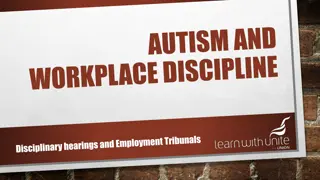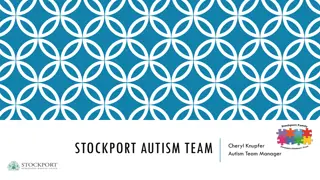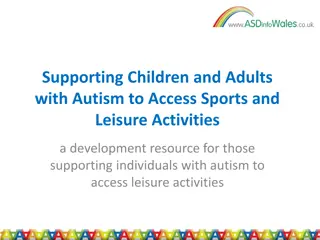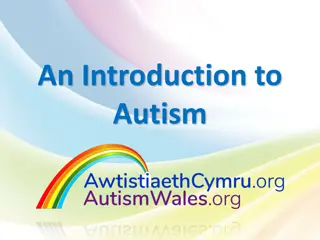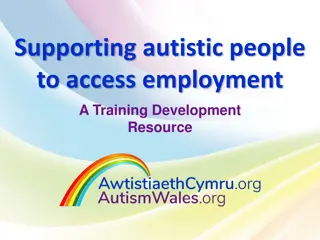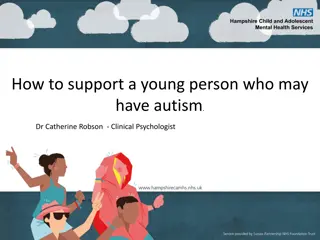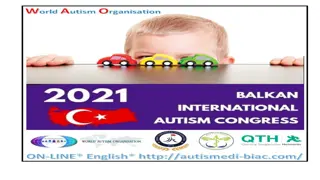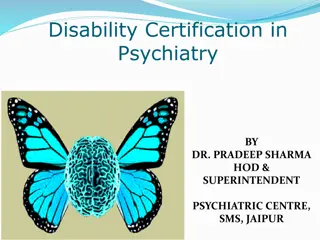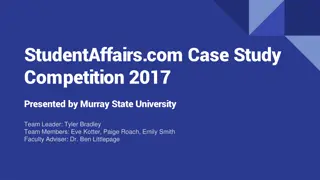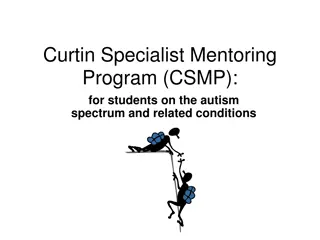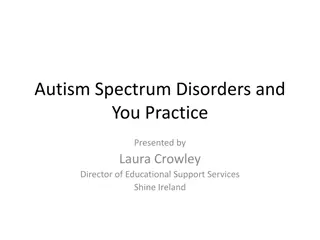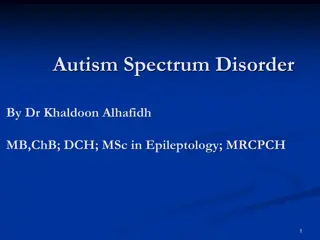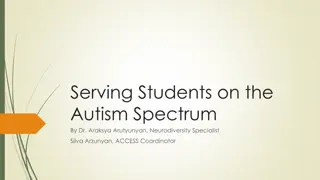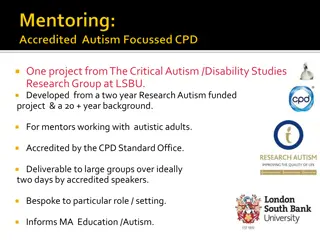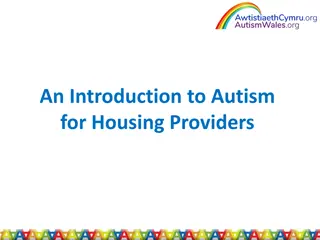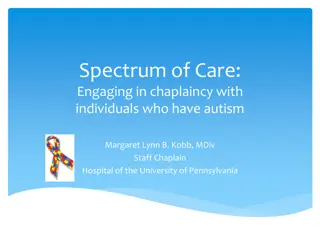Understanding Autism: Research, Causes, and Characteristics
This content delves into the world of autism, exploring research studies, grants, and the expertise of Dr. Dario Siniscalco in Italy. It highlights the definition of autism, its causes - both valid and invalid theories, and the unique strengths associated with autism. Additionally, it covers research interests focusing on gene expression, regulation, and the use of stem cells in autism treatment.
Uploaded on Nov 25, 2024 | 0 Views
Download Presentation

Please find below an Image/Link to download the presentation.
The content on the website is provided AS IS for your information and personal use only. It may not be sold, licensed, or shared on other websites without obtaining consent from the author. Download presentation by click this link. If you encounter any issues during the download, it is possible that the publisher has removed the file from their server.
E N D
Presentation Transcript
EDITOR IN CHIEF of AUTISM Dr. Research Associate, Department of Experimental Medicine, Second University of Naples (SUN), Italy Centre for Autism Cancell 50132, Italy Dr. Dario Research Associate, Department of Experimental Medicine, Second University of Naples (SUN), Italy Centre for Autism La Cancell autismo 50132, Italy Dario Siniscalco Siniscalco La Forzadel No profit association for Autism care, Florence Forzadel Silenzio Silenzio, Caserta 81036, Italy , Caserta 81036, Italy autismo No profit association for Autism care, Florence
GRANTS - 2010 Autism Research Institute (ARI) Funded Research Studies Research that makes a difference , research project funded by ARI: Molecular pathways involved in oxidative stress and leaky gut impairment in autism spectrum disorders. FELLOWSHIPS/AWARDS - 2010 Royan Institute of Teheran grant for the 6th Congress on Stem Cell Biology & Technology, Royan International Twin Congress, Tehran, Iran. - 2010 Italian Pharmacology Society award for the meeting on Cellular and Molecular Aspects of Pharmacologic Control of Pain, Parghelia, Italy. - 2003 Grant of Italian Pharmacology Society for scientific research training in U.A.B. University of Alabama at Birmingham, AL. - 2000-2004 Fellowship for PhD course in Pharmacological Sciences, Second University of Naples
Research Interests Autism Autism Spectrum Disorders Gene expression and molecular regulation in autism spectrum disorders use of human mesenchymal stem cells as therapeutic tool in autism.
What is Autism ? Autism is first described by Leo Kanner in 1943 as early infantile autism Autism is defined as lifelong developmental disability that typically appears during the first three years of life and is the result of a neurological disorder that affects the normal functioning of the brain, impacting development in the areas of social interaction and communication skills
CAUSES Autism cause is unknown, No guidelines for preventing Invalid theories Postnatal environment: allergies, and exposure of children to drugs, vaccines, infection, certain foods Lack of Vitamin D Refrigerator mother Valid theories Genetic factors: the most significant cause Prenatal environment: age in either parent (m40+; f40+, m-30); diabetes, bleeding, and use of psychiatric drugs in the mother during pregnancy
CHARACTERISTICS OF CHARACTERISTICS OF AUTISM AUTISM STRENGTHS: Reading skills Exceptional balance Drawing skills Computer skills Exceptional memory Music skills
Weaknesses Weaknesses Social Interaction Communication Bizarre behaviours Repetitive behaviours Sensory issues Motor issues Self-injuries behaviours
Types of Autism Autistic Disorder - "Autism is a complex developmental disability that typically appears during the first three years of life and is the result of a neurological disorder that affects the normal functioning of the brain, impacting development in the areas of social interaction and communication skills. Both children and adults with autism typically show difficulties in verbal and non-verbal communication, social interactions, and leisure or play activities. Pervasive Developmental Disorder (P.D.D) - Also called "Atypical Autism." Children with this disorder have many of the same characteristics of Autism, but not all the criteria associated with Autism.
Asperger's Disorder - Children with this disorder do not have the usual language barriers associated with Autism and are generally very intelligent. However, they do tend to struggle with social interactions, and can fixate on a particular object or subject they take an interest in, and talk about it constantly. Retts Disorder - Retts is rather similar to Autism, but presents only in girls. The children begin to develop on target, but then begin losing some communication abilities. The symptoms of Retts can begin to occur between ages 1 and 4.
TREATMENTS & THERAPIES TREATMENTS & THERAPIES Disabilities are lifelong and there is no known cure Biomedical Medication Diets Behavioural Applied Behaviour Analysis (ABA) Son-Rise Program Communication therapies Sign Language Facilitated Communication (FC) Other Therapies Music Therapy Service Dogs
OMICS International www.omicsonline.org OMICS International (and its subsidiaries), is an Open Access publisher and international conference Organizer, which owns and operates peer-reviewed Clinical, Medical, Life Sciences, and Engineering & Technology journals and hosts scholarly conferences per year in the fields of clinical, medical, pharmaceutical, life sciences, business, engineering, and technology. Our journals have more than 3 million readers and our conferences bring together internationally renowned speakers and scientists to create exciting and memorable events, filled with lively interactive sessions and world-class exhibitions and poster presentations. Join us! OMICS International is always open to constructive feedback. We pride ourselves on our commitment to serving the Open Access community and are always hard at work to become better at what we do. We invite your concerns, questions, even complaints. Contact us at contact.omics@omicsonline.org. We will get back to you in Contact us at: contact.omics@omicsonline.org 24-48 hours. You may also call 1-800-216-6499 (USA Toll Free) or at +1-650-268-9744 and we will return your call in the same timeframe.
AUTISM Related Journals Journal of Neurological Disorders Brain Disorders & Therapy Journal of Neurology & Neurophysiology African Journal of Psychiatry: Open Access Open Access
AUTISM Related Conferences http://www.conferenceseries.com/
OMICS Group Open Access Membership Open Access Membership OMICS publishing Group Open Access Membership enables academic and research institutions, funders and corporations to actively encourage open access in scholarly communication and the dissemination of research published by their authors. For more details and benefits, click on the link below: http://omicsonline.org/membership.php






